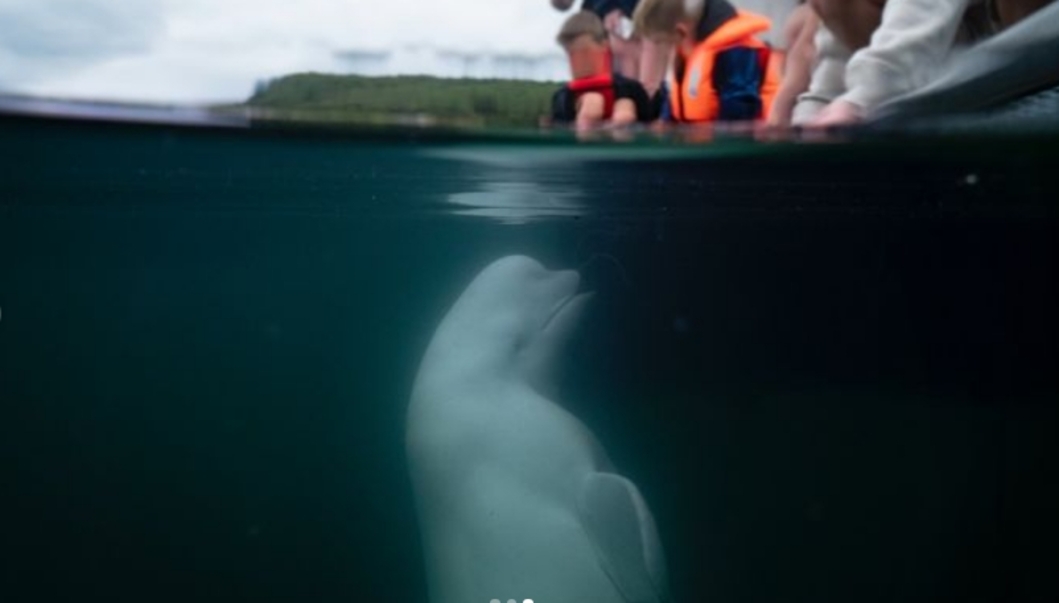The legend of Hvaldimir has come to an end. The beluga whale, believed by some to be a Russian spy, was found dead on Saturday, August 31, by the NGO Marine Mind, which had been tracking him for several years. The founder of the NGO, Sébastien Strand, spotted the lifeless body of the cetacean floating near Risavika, a port in southwestern Norway, on Saturday, as per reports.
Discovery of Hvaldimir’s Body in Southern Norway
Hvaldimir’s body was discovered by a father and son who were out fishing near Risavika Bay. This area in southwestern Norway has now become the final resting place of this once-famous beluga. At this stage, the cause of his death is unknown. According to the last reports from the day before his death, he appeared to be in good health. Marks possibly made by birds or marine animals were noticed on the beluga’s corpse. Heartbroken, Sébastien Strand said, noting that Hvaldimir had “Touched the lives of tens of thousands, bringing people together in awe of the wonders of nature.” Marine Mind is working to have the beluga’s body transferred to a facility that can preserve it long enough to determine the cause of death.
The Mysterious Origins: Was Hvaldimir a Russian Spy Whale?
Hvaldimir was not just any beluga. The cetacean, estimated to be 4 meters long and weighing over 1,200 kilograms, fascinated the public. He was first spotted by fishermen in 2019 off the coast of Ingoya Island in northern Norway. At the time, his appearance was intriguing: the beluga was wearing a harness around his head with the inscription “Equipment Saint Petersburg,” a device potentially capable of holding a camera. The speculation about his origins sparked international interest, leading to theories that he might have been trained by the Russian military for espionage purposes. While these rumors were never confirmed by Russian authorities, they added an air of mystery around Hvaldimir.
Similar Posts
Hvaldimir’s Life in Norway: A Cross-Species Ambassador
Despite the initial suspicions surrounding his origins, Hvaldimir became known for his affectionate behavior, such as retrieving cell phones dropped by humans into the sea, which gained him widespread attention. He was notably social, often interacting with fishermen and tourists. Various government and nonprofit organizations, including Marine Mind, monitored the whale and observed him routinely visiting boats and playing fetch. His presence highlighted the potential dangers marine life faces due to human activity, as Hvaldimir’s tendency to approach people and boats resulted in multiple injuries from fishing hooks, ship propellers, and foreign objects.
Impact on Ocean Conservation and Environmental Awareness
Hvaldimir’s story spread beyond Norway, and in 2022, the Orca Channel premiered a documentary titled (translated) “A Tale of a Whale – Hvaldimir’s Journey in Norway.” His life and the subsequent efforts to protect him brought significant attention to ocean conservation issues. Organizations like Norwegian Orca Survey, OneWhale and Marine Mind played crucial roles in advocating for his safety and raising awareness about the broader implications of human activities on marine ecosystems. Hvaldimir’s story serves as a reminder of the fragile balance between human interaction and wildlife conservation.
Hvaldimir’s Death: Ongoing Investigations and Unanswered Questions
Despite being beloved by the Norwegian people, Hvaldimir’s body was found floating off Lisavika in southern Norway on the afternoon of August 31, 2024. The exact cause of his death remains unknown, and an autopsy is currently underway to uncover more details. The Natural History Museum in Oslo has expressed a desire to collect tissue samples, while OneWhale is advocating for cremation and scattering the ashes at sea. Speculation remains about whether human activities contributed to his untimely demise, as the area where he was found is heavily trafficked, raising concerns that his death may not have been natural.
Legacy of a Beluga: Hvaldimir’s Enduring Impact
Hvaldimir’s unusual behavior, particularly his close interactions with humans and boats, may have stemmed from his need for companionship, a trait often seen in solitary marine animals. This behavior, while endearing, may have also made him vulnerable. Hvaldimir’s legacy as a cross-species ambassador will be remembered by many, and his story continues to inspire efforts towards greater environmental consciousness and marine protection.
Mourning the Loss of a Marine Icon
“Hvaldimir bridged the gap between humans and wild animals in a way that few can. He was special to so many, leaving a lasting mark on all who had the privilege to encounter him.” Strand said through an instagram post. “Rest in peace, Hvaldimir. You will be deeply missed, but never forgotten.” he concluded. Hvaldimir’s life and death underscore the complexities of human-animal interactions and the ongoing need for vigilance in protecting our planet’s most vulnerable species.


















